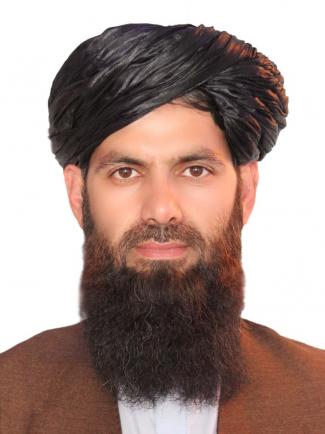Sharia
پوهنحی شرعیات
پوهنحی شرعیات در سال ۱۳۹۸ در بدنه موسسه تحصیلات عالی دایکندی با دو دیپارتمنت فارغده ( فقه جعفری و تعلیمات اسلامی) ایجاد گردید. دیپارتمنت تعلیمات اسلامی در سال ۱۳۹۹ برای اولین بار به تعداد ( ۲۹ ) تن محصل را در دو بخش ذکور و اناث جذب نمود. تعداد اعضای کادر علمی این دیپارتمنت در سال اول ( ۲ ) تن و در سال ۱۴۰۰ به ( ۳ ) تن افزایش نمود و در سال ۱۴۰۱ یک تن دیگر نیز به جمع اعضای کادری آن افزوده گردید، و حال دارای چهار تن از اعضای کادر علمی می باشد. در مجوع تعداد محصلین این دیپارتمنت ( ۹۴ ) تن بوده که به تعداد ( ۳۲ ) محصل ذکور و به تعداد ( ۶۲ ) محصل اناث میباشد. این دیپارتمنت تا اکنون فارغ نداده و فعلا تا سال سوم محصل دارد.
دیدگاه دیپارتمنت تعلیمات اسلامی
رشته تعلیمات اسلامی یک واحد فعال تحصیلی در چارجوب پوهنحی شرعیات می باشد که هدف آن تربیه و آموزش آگاهان و کادر های متخصص در بخش قضا، افتاء، تبلیغ، دعوت و کارشناسان علوم اسلامی و ارائه تحصیلات عالی با کیفیت و معیاری متناسب با نیازهای جامعه و بازار کار می باشد.
رسالت دیپارتمنت تعلیمات اسلامی
دیپارتمنت تعلیمات اسلامی رشد و ارتقای سطح دانش مسلکی دانشجویان، مساعد ساختن زمینه های فراگیری دانش تخصصی علوم شرعی و علوم مرتبط را بر اساس نیازمندی های جامعه رسالت خود می داند.
اهداف آموزشی رشته تعلیمات اسلامی
رشته تعلیمات اسلامی یک واحد فعال تحصیلی در چهارچوب پو هنحی شرعیات می باشد که هدف آن تربیه و آموزش آگاهان و کادر های متخصص در بخش افتا ، تدریس علوم شرعی، دعوت، مشاوره و حکمیت، آشنایی با تفاسیر و علوم القرآن، حدیث و علوم آن بطور دقیق و مسلکی ،فقه، اصول فقه، و قضاء ، څارنوالی، وکالت دفاع و حقوق به وجه عام در قالب نصاب درسی معیاری و تائید شده از جانب وزارت محترم تحصیلات عالی بوسیله کادر متخصص، میباشد.
نتایج متوقعه رشته تعلیمات اسلامی
-
- کسب دانش شرعی، فقهی، حقوقی و فهم دقیق از مفاهیم عالی شریعت اسلامی و قوانین موضوعه کشور.
- کسب مهارتهای عملی به هدف تطبیق بهتر احکام شرعی و کسب مهارتهای مربوط به سکتور قضاء ، څارنوالی، وکالت دفاع و سایر نهاد های شرعی و حقوقی.
- کسب مهارت و دانش مسلکی به منظور توانایی بررسی و ارزیابی چگونگی مطابقت قوانین کشور با معتقدات اسلامی.
- کسب توانایی در تحلیل فلسفی مباحث شرعی و حقوقی، مقارنه و مقایسه موضوعات مختلف در پرتو شریعت اسلامی، قوانین نافذه کشور و عرف پسندیده.
- کسب مهارت تفسیر، تحلیل و برداشت میانه رو و معتدل از قرآن و سنت، آشنایی با شیوه های درست تفسیر قرآنکریم، تخریج احادیث و تحلیل مطلوب نصوص قانونی و کسب مهارت در استدلال منطقی و حقوقی.
- کسب مهارت به منظور تعمیم ارشاد معتدل دینی، آگاهی دهی حقوقی، تعلیم ارزش ها و مسایل شرعی.
- توانایی در امر مقارنه میان ادیان مطرح در جهان ،نقد پلورالیزم دینی و تحلیل اصول اعتقادی مذاهب کلامی اسلامی.
تعریف فارغ التحصیلان رشته تعلیمات اسلامی
برنامه (تعلیمات اسلامی) پوهنحی شرعیات موسسه تحصیلات عالی دایکندی، به منظور پرورش کادر های متخصص و مسلکی برای ( نهاد های عدلی ؛ قضایی ؛ څارنوالی؛ وکالت دفاع؛ اوقاف ؛ و مشاوران نهاد های اجرایی، مشاوران شرعی و حقوقی، تدریس در پوهنتون ها، سرپرستی در ولایات و ولسوالی ها، عضویت در مراکز پالیسی ساز، فعالیت در نهاد های مدنی و مشاورین حقوقی در موسسات و نهاد های خصوصی و سایر بخش های عمومی) ایجاد شده است. به این اساس برنامه (تعلیمات اسلامی) فردی را فارغ التحصیل دوره لیسانس خویش میداند که حد اقل (۱۳۶) کریدت را در یک دوره تحصیلی چهار ساله ( ۸ سمستر ) تکمیل نموده و در بخش دانش، مهارت ها و سلوک شرایط ذیل را دارا باشد:
۱-در بخش دانش: فارغ التحصیل برنامه ( تعلیمات اسلامی) بتواند در حد لیسانس بر موضوعات ( آگاهی از اصول و عقاید اسلامی، درک ارزش های اسلامی و ملی، روش های حل مسالمت آمیز اختلافات، شیوه های تحکیم روابط اجتماعی و فامیلی و حقوقی، درک مسایل اصولی، فقهی، حقوقی و قوانین، آگاهی از شیوه های اداره و مدیریت در نهاد های عامه و شیوه های نوشتن مکاتب حقوقی تسلط داشته باشد، وظایف و مسئولیت های خود را به شکل احسن انجام دهد، اعتماد به نفس داشته و به منافع ملی و ارزش های اسلامی ارجحیت داده، و شخصیت با اخلاق و دانشمند در علم شرعی باشد تا بتواند به عنوان کادر متخصص دیپارتمنت تعلیمات اسلامی در جامعه عرض وجود نماید.
۲- در بخش مهارت ها: فارغ التحصیل برنامه (تعلیمات اسلامی) فردی است که در حد لازم آشنایی با زبان های بین المللی داشته، با قواعد زبان عربی بلدیت داشته، ظرفیت مدیریتی، آشنایی با پروگرام آفیس و برنامه های کمپیوتر، قابلیت تدویر برنامه های آموزشی و سخنورخوب باشد و توانایی حل مشکلات خود را در بخش های مربوطه داشته باشد.
۳- در بخش سلوک: فارغ التحصیل برنامه (تعلیمات اسلامی) فردی است که از پروگرام درسی مضامین تخصصی و مسلکی خویش احترام به ارزش های اسلامی و ملی، اخلاق حسنه و سلوک اکادمیک، دین دوستی و وطن دوستی، احترام به ارزش های دینی، حقوقی و انسانی را فرا گرفته باشد که بتواند عدالت را در تمام امور به بهترین وجه تامین کند و متعهد به وطن و وظیفه باشد.
حوزه کاری فارغ التحصیلان رشته تعلیمات اسلامی
حوزه کاری فارغ التحصیلان رشته تعلیمات اسلامی قوه قضائیه، څارنوالی، وزارت عدلیه، وزارت حج و اوقاف، معارف، انجمن وکلای مدافع، پوهنتون ها، موسسات و نهاد های علمی و فرهنگی، مشاوریت های حقوقی و دینی قوه اجرائیه، مشاوریت های حقوقی و شرعی بانک ها و سکتور های خصوصی و به طور عموم در بخش های اداری و همچنان پوست های سیاسی می باشد.
